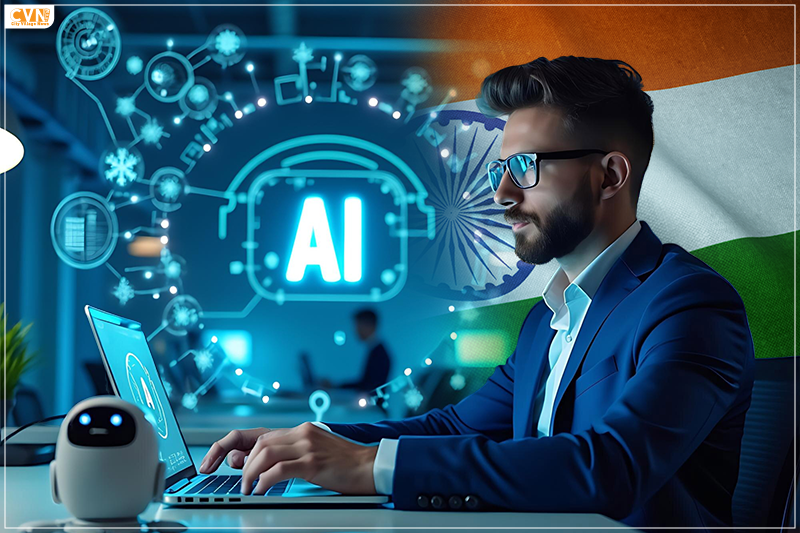At a time, where a few taps on a screen can unlock a new world of possibilities, the travel sector is being transformed at a rapid pace. These days, flights are tracked in real-time, hotels are booked in seconds, and chatbots provide assistance for travel-related queries faster than a human ever could. Behind this seamless experience is a new-age technology—Artificial Intelligence (AI). Continue reading to know how artificial intelligence in India is redefining the way you travel.
AI-Driven Trip Planning
Gone are the days of one-size-fits-all itineraries. Travel planning in India is becoming smarter and more intuitive. They may track when was the last time you booked a flight, where you’ve been, and even the airlines you prefer. This allows them to suggest the best time to book a flight, customize deals, and recommend flights tailored to your budget and taste.
For Indian families, especially those traveling with elders or kids, AI-powered suggestions can be a blessing. Want to book an affordable itinerary for your summer travel to India? The algorithm already knows. Looking for a nonstop flight from Newark to Mumbai? It’s a few clicks away.
Smooth Journeys at Smart Airports in India
India’s busiest airports—like Delhi, Bengaluru, and Hyderabad—are embracing technology like never before. Notably, facial recognition systems under the DigiYatra program are transforming passenger movement. Travelers are now breezing through airport touchpoints using biometric data instead of flashing IDs and tickets at every checkpoint.
Interestingly, Delhi Airport has already implemented this at T3. Bengaluru, Varanasi and several other Indian airports have followed suit. Not only does this reduce wait times, but it also limits physical contact—an added advantage post-COVID. AI is also helping airports in India manage crowd flow. Real-time data predicts rush hours, allocates staff more efficiently, and even controls lighting and temperature for energy savings.
Also Read: Technology at Airports in India
Airlines Adopting AI to Improve Passenger Experience
Many airlines in India have already started using artificial intelligence not only to enhance passenger experience but their operations too. For instance, IndiGo is using AI to manage crew scheduling and predict flight delays. Vistara has also adopted AI-driven tools to personalize in-flight services, from meal preferences to entertainment recommendations.
Under its new ownership, Air India is investing in AI-based customer service. Their chatbot ‘Maharaja’ now handles common queries. It also checks flight status and helps in web check-ins. And for frequent flyers who value comfort, Air India’s AI-enhanced Upgrade+ program makes it easier to bid for business class seats. This is based on real-time seat availability and traveler history.
Personalized Stays as Hotels Turn Smart
From check-in to room service, artificial intelligence is quietly working behind the scenes at many hotels in India. Notably, at some Taj and Oberoi properties, guests can use voice assistants in rooms. This feature helps them to control lights, air conditioning, and even order food.
By using artificial intelligence in India, hotel owners can identify patterns—like which guests love window views or need airport pickups—and offer these services proactively. In the age of AI, it’s not just about convenience; it’s about providing customers with the best service.
AI-Powered Translation Apps Breaking Language Barriers
India’s diversity is beautiful. However, it can pose challenges for non-native travelers. To address this, AI-driven translation tools are available. No matter if it’s a Tamil-speaking cab driver in Chennai or a Bengali vendor in Kolkata, you can now communicate through apps that translate in real-time.
Furthermore, Google Lens and other AI apps can scan menus, signboards, and even handwritten notes. This makes it easier for tourists—both domestic and international—to feel at ease.
Also Read: TSA Introduces Handheld Language Translation Devices at Philadelphia Airport
It Still Maintains Human Touch
While AI makes travel more efficient, it doesn’t completely strip away the human touch. Instead, it enhances it. For example, a grandmother visiting her children in New York can now get automated flight updates in Hindi. A student flying to Chicago for the first time can ask a chatbot about baggage limits at 2 AM.
The future of AI in the Indian travel industry is bright. In coming years, you can expect predictive maintenance for planes, voice-based travel bookings, AI-guided tours, and even smart immigration counters. As the country’s travel sector continues to grow, artificial intelligence in india will be at the heart of this transformation.
Follow City Village News to stay updated about the latest happenings in the travel and technology sector.
| Disclaimer: City Village News claims no credit for the images featured on its blog site. All the visual content is copyrighted to its respective owners only. We mention the source name of the picture whenever possible and found. However, please get in touch with us if we miss acknowledging the owner’s source. In case the owners don’t want us to use their images, we will remove them promptly. We believe in providing proper attribution to the original author, artist, and photographer. |

